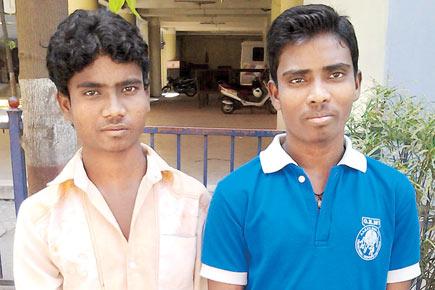Doctors treating a teenage patient say SCD cases, though rare, have been recorded at most civic hospitals. The genetically transmitted disease is more common in some central Indian states

A relatively unknown, dangerous genetic blood disorder that can be fatal if undiagnosed, may have silently crept into Mumbai. Raja Yadav, an 18-year-old boy who is battling the debilitating disease known as sickle cell anemia may not be the only one in the city with the disease, though as of now he is one of the very few to be diagnosed with it.

Brothers Ajay and Raja Yadav who were reunited recently
ADVERTISEMENT
The teenager was recently reunited with his younger brother following a report in mid-day (Sion hospital becomes home for orphan with blood disorder, mid-day April 7). But doctors now say, since this blood disorder is hereditary in nature, even his brother Ashok will have to go through a battery of tests to ensure he is not afflicted with the same disease.
Medical experts say most Sickle Cell Disease (SCD) patients hail from central Indian states. “The disease is not very common in Mumbai. Most patients we have come across, are migrants from Jharkhand and Bihar or are from Nagpur or the Amravati belt in Maharashtra,” said Dr Harshad Argekar, associate professor at the orthopaedic department of Sion hospital.
“In Raja’s case, since his hip bones were damaged at a tender age, we had to wait for his bones to fully develop before we could operate on him. We will now have to test his brother, Ashok, who is expected to come to the hospital soon,” added Dr Argekar. He said the hospital gets around four to five SCD patients every three months.
Speaking to Sunday mid-day, Dr Sachin Bhonsle, consultant orthopaedic surgeon at Mulund’s Fortis hospital, said, “There are two types of SCD, both of which are genetically transmitted. If both parents are carriers, they should be counselled before having children.”
At the hospital, doctors treat nearly 30 SCD patients each year, some of whom require multiple joint replacements caused by avascular necrosis.
SCD is a genetic blood disorder where the shape of hemoglobin cells is ‘sickle’ shaped due to which its oxygen binding capacity decreases.
In severe cases where SCD is diagnosed late, patients tend to develop avascular necrosis, or cellular death of the bone components due to lack of blood supply.
 Subscribe today by clicking the link and stay updated with the latest news!" Click here!
Subscribe today by clicking the link and stay updated with the latest news!" Click here!







